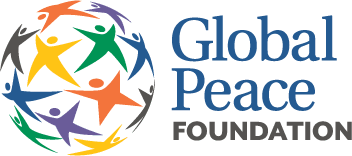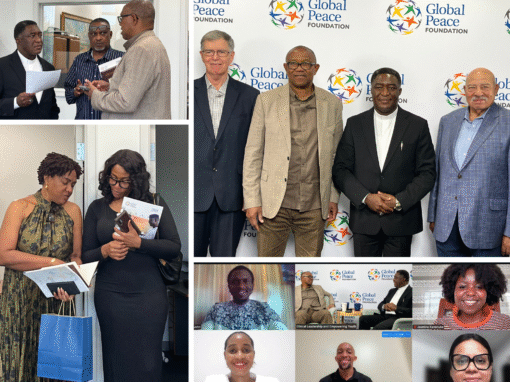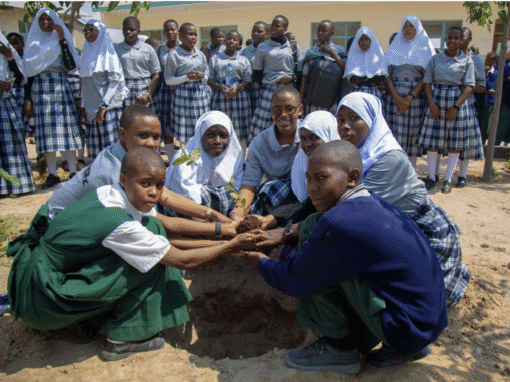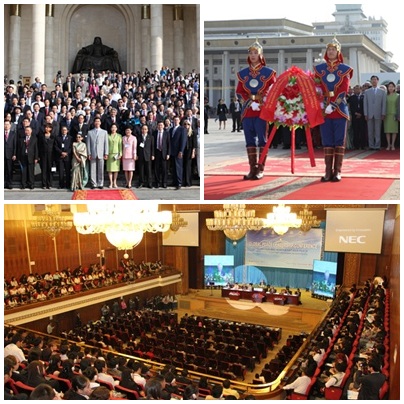
International leaders honor Mongolia’s founders at a wreath-laying ceremony, Global Peace Leadership Conference.
ULAANBAATAR, 26 August, 2011—Hundreds of international leaders from government, faith organizations, service initiatives, and businesses gathered on August 26 at the Chinggis Khann monument in Ulaanbaatar, the capital of Mongolia, for a wreath-laying ceremony to honor the founders of the Mongolian nation.
The commemoration preceded the opening of the Global Peace Leadership Conference, “Mongolia and Northeast Asia Peace,” at the Great Hall of the State Palace. The conference focused on prospects for international collaboration on issues ranging from energy and trade initiatives to strengthening civil society through community-based outreach to supporting strong and stable families.
Not only are the conference’s keynote speakers from a broad spectrum of cultural heritages, but many of its participants represent a blend of cultures in their own life experiences. For example, Jan Rogala, a Polish scholar, teaches Mongolian studies in Warsaw and Emanuel Pastreich, an American professor with a doctorate from Harvard, teaches Korean and Japanese literature at Kyung Hee University in Seoul.
“I believe it’s important not only to read about international exchange and cooperation,” Pastreich remarked, “but also to develop a plan of action to achieve those goals, as this conference does.”
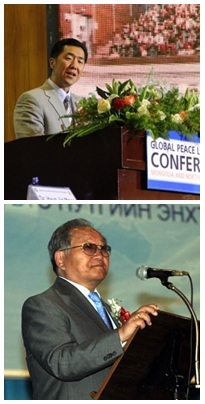
Global Peace Foundation Chairman Dr. Hyun Jin Moon (top) and Ambassador Tsakhilgaan, Secretary-General of the Convention of World Mongolians, address Conference delegates.
In the opening plenary, international presenters spoke of the critical need for collaborative efforts as a foundation for lasting peace. “The cold war may have ended more than 20 years ago but its remnants still remain and there is much to be done in the region, said Ambassador Tsakhilgaan, Secretary-General of the Convention of World Mongolians. “Our responsibility is to intensify our efforts for peace, working hand in hand with neighboring countries.”
“Stable economic development can provide a foundation for peace,” added Dr. Manu Chandaria, a leading Kenya-based businessman and humanitarian. “For this we must bridge not only differences among ethnic identities but also economic inequities. Trans-boundary relationships secure peace and stability and are a precondition for investment and development.” Chandaria is CEO of the Comcraft Group and founder of the East Africa Business Council.
Global Peace Foundation Chairman Dr. Hyun Jin Moon noted that, in spite of the good intentions and efforts of the UN and government bodies after more than fifty years, the problems of conflict, poverty, disease, and environmental degradation remain. He declared that a new paradigm and framework for peace is necessary—one that addresses the world’s most pressing problems at their root, on a spiritual dimension,and responds to the aspirations and inalienable rights that are common to all of humankind.
Participants in the Global Peace Leadership Conference will take steps to analyze and discuss each of those critical issues using this paradigm and will work collaboratively to produce a plan of action and guiding principles for each arena.
Contact: Michael Marshall 8870-8483 (Mongolia); mmarshall@globalpeacefestival.org
